
This timeline was posted to the University of San Diego website in January 2002 and appears to be copyright Steve Schoenherr. It was taken down in 2010, whereupon I copied it to this website.
League of Nations Fight - A Chronology
Nov. 11, 1918 - Armistice ends fighting in Europe
Jan. 18, 1919 - Peace Conference opens in Paris; Big 4 include Lloyd George of Britain, Orlando of Italy, Clemenceau of France, and Woodrow Wilson
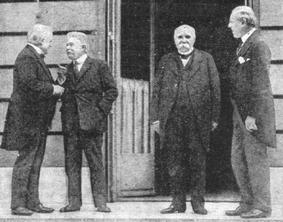 (from Literary Digest, 7/5/1919)
(from Literary Digest, 7/5/1919)
Feb. 14, 1919 - Wilson submits Draft Covenant for a League of Nations
- The Covenant becomes the first 26 Articles of the Treaty
- especially the key Article 10
Feb. 15, 1919 - Wilson leaves Paris, returns to the United States
Feb. 24, 1919 - Wilson arrives in Boston; gives speech promoting League
Feb. 26, 1919 - Wilson dinner meeting with Congress foreign policy leaders; "tea with the Mad Hatter"
Feb. 28, 1919 - Lodge speech rejects principle of mutual guarantee
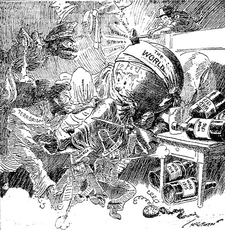 "A Nervous Wreck" (from Literary Digest, 7/5/1919)
"A Nervous Wreck" (from Literary Digest, 7/5/1919)
Mar. 2, 1919 - 39 Senators sign Round Robin to separate League from Treaty
Mar. 3, 1919 - 65th Congress adjourns
Mar. 4, 1919 - Wilson speech in New York declares Covenant and League are inseparable; Wilson returns to Paris
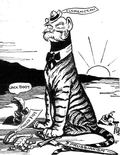
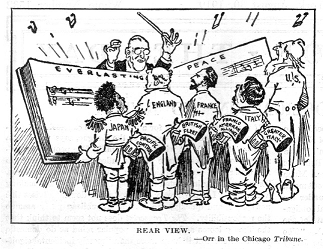
(both from Literary Digest, 1919)
Mar.5-, 1919 - Wilson allows 4 changes in Covenant: no member need accept a mandate; domestic affairs excluded; Monroe Doctrine not impaired; may withdraw after 2 years' notice
May 19, 1919 - 66th Congress opens; different positions on Treaty:
- Strong Internationalists (Wilson, 27 Dem.)
- Limited Internationalists (Butler, Taft, 8 Rep.)
- Mild Reservationists (Hitchcock, 20 Rep. and 20 Dem.)
- Strong Reservationists (Lodge, 7 Rep.)
- Irreconcilables (Borah, Johnson, 14 Rep. and 1 Dem.)
Jun. 9, 1919 - Borah publishes copy of Treaty
Jun. 10, 1919 - Knox introduces resolution to separate Treaty of League, but is defeated in Senate
Jun. 28, 1919 - Treaty of Versailles signed in Hall of Mirrors and ratified by Germany (July 7), France (Oct. 13), England (Oct. 15), Italy (Oct. 15), Japan (Oct. 30)
July 8, 1919 - Wilson arrives in U.S. and presents Treaty to Senate July 10;"The stage is set, the destiny disclosed."
July 14-28 - Lodge reads all 246 pages of Treaty aloud to Senate
 Henry Cabot Lodge (from McClures, 11/1904)
Henry Cabot Lodge (from McClures, 11/1904)
July 31-Sept. - Lodge conducts public hearings; calls 60 witnesses
Aug. 19, 1919 - Wilson at 3 hour lunch meeting with entire Senate Foreign Relations Committee agrees to interpretative reservations
Sept. 4, 1919 - Wilson's 8000 mile tour, 40 speeches in 29 cities in 22 days (see map below)
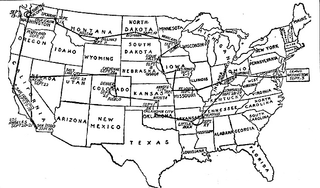 Wilson's Trip to Save the League (from Literary Digest, 9/15/1919)
Wilson's Trip to Save the League (from Literary Digest, 9/15/1919)
Sep. 10, 1919 - Borah and Johnson begin national tour to oppose Treaty
Sep. 10, 1919 - Committee proposes 45 amendments and 4 reservations; all amendments defeated by Senate; sent back to Committee
Sep. 25, 1919 - Wilson collapses in Pueblo, Col.; returns to D.C.; suffers stroke Oct. 2; ill for 7 months
Nov. 6, 1919 - Committee proposes 14 Lodge reservations
LODGE RESERVATIONS:
1.... in case of notice of withdrawal from the league of nations, as provided in said article [Article 1], the United States shall be the sole judge as to whether all its international obligations . . . have been fulfilled, and notice of withdrawal . . . may be given by a concurrent resolution of the Congress of the United States
2. The United States assumes no obligation to preserve the territorial integrity or political independence of any other country . . . under the provisions of article 10, or to employ the military or naval forces of the United States under any article of the treaty for any purpose, unless in any particular case the Congress, which . . . has the sole power to declare war . . . shall . . . so provide
3. No mandate shall be accepted by the United States under article 22 . . . except by action of the Congress of the United States
4. The United States reserves to itself exclusively the right to decide what questions are within its domestic jurisdiction...
5. The United States will not submit to arbitration or to inquiry by the assembly or by the council of the league of nations . . . any questions which in the judgment of the United States depend upon or relate to . . . the Monroe doctrine; said doctrine is to be interpreted by the United States alone and is... holly outside the jurisdiction of said league of nations...
6. The United States withholds its assent to articles 156, 157, and 158 [Shantung clauses]...
7. The Congress of the United States will provide by law for the appointment of the representatives of the United States in the assembly and the council of the league of nations, and may in its discretion provide for the participation of the United States in any commission.... no person shall represent the United States under either said league of nations or the treaty of peace . . . except with the approval of the Senate of the United States...
9. The United States shall not be obligated to contribute to any expenses of the league of nations . . . unless and until an appropriation of funds . . . shall have been made by the Congress of the United States
10. If the United States shall at any time adopt any plan for the limitation of armaments proposed by the council of the league . . . it reserves the right to increase such armaments without the consent of the council whenever the United States is threatened with invasion or engaged in war...
14. The United States assumes no obligation to be bound by any election, decision, report, or finding of the council or assembly in which any member of the league and its self-governing dominions, colonies, or parts of empire, in the aggregate have cast more than one vote
Nov. 7, 1919 - Wilson tells Hitchcock "Let Lodge compromise!"
Nov. 13, 1919 - Hitchcock proposes to Senate 5 mild reservations as alternative to Lodge reservations, but rejected by Committee
Nov. 18, 1919 - Wilson letter to Democrats urging defeat of Lodge reservations
Nov. 19, 1919 - Senate rejects Treaty with 14 Lodge reservations 39-55; then Senate rejects original Treaty 38-53
Dec. 29, 1919 - Mild Reservationists demand Lodge seek a compromise
Jan. 8, 1920 - Wilson insists Treaty must not be re-written by Senate
Jan. 16, 1920 - Bipartisan Committee announced by Lodge to seek compromise
Jan. 23, 1920 - Bipartisan Committee agrees on compromise mild reservations, but opposed by Lodge and Irreconcilables
Jan. 27, 1920 - Democrats in Bipartisan Committee offer Hitchcock reservation to Article 10 but rejected by Republicans
HITCHCOCK RESERVATION: The United States assumes no obligation to employ its military or naval forces or the economic boycott to preserve the territorial integrity or political independence of any other country member under the provisions of Article X or to employ the military or naval forces of the United States under any article of the treaty for any purpose unless in any particular case the Congress which under the Constitution has the sole power to declare war or authorize the employment of the military or naval forces of the United States shall by Act or joint resolution provide. . Nothing herein shall be deemed to impair the obligation in Article 16 concerning the economic boycott
Jan. 29, 1920 - Democrats agree to support Taft reservation to Article 10 but rejected by Lodge
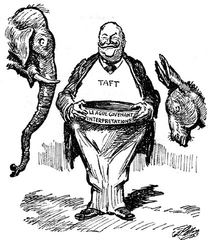 (from Literary Digest,
8/9/1919 - the elephant and the donkey are the symbols of the Republican and the
Democrat political parties in the USA.)
(from Literary Digest,
8/9/1919 - the elephant and the donkey are the symbols of the Republican and the
Democrat political parties in the USA.)
TAFT RESERVATION: The United States declines to assume any legal or binding obligations to preserve the territorial integrity or political independence of any other country under the provisions of Article X or to employ the military or naval forces of the United States under any article of the treaty for any purpose; but Congress which under the Constitution has sole power in the premises, will consider and decide what moral obligation if any under the circumstances of any particular case, when it arises, should move the United States in the interest of world peace and parties, to take action therein and will provide accordingly
Feb. 1, 1920 - England, France declare they would accept Senate reservations
Feb. 9, 1920 - Senate votes to reconsider Treaty and refers it to Committee
Feb. 10, 1920 - Committee approves of Treaty with Lodge reservations
Mar. 8, 1920 - Wilson repeats his opposition to Lodge reservations
Mar. 19, 1920 - Senate defeats Treaty with 15 Lodge reservations 49-35
May 20, 1920 - Congress ends war by joint resolution but vetoed by Wilson
Nov. 2, 1920 - Warren Harding elected in a "great and solemn referendum."
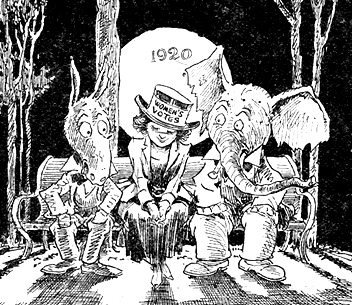 (from Literary Digest, 6/28/1919)
(from Literary Digest, 6/28/1919)
July 2, 1921 - Congress ends war by joint resolution
Oct. 18, 1921 - Separate treaties with Germany, Austria, Hungary ratified
|
|